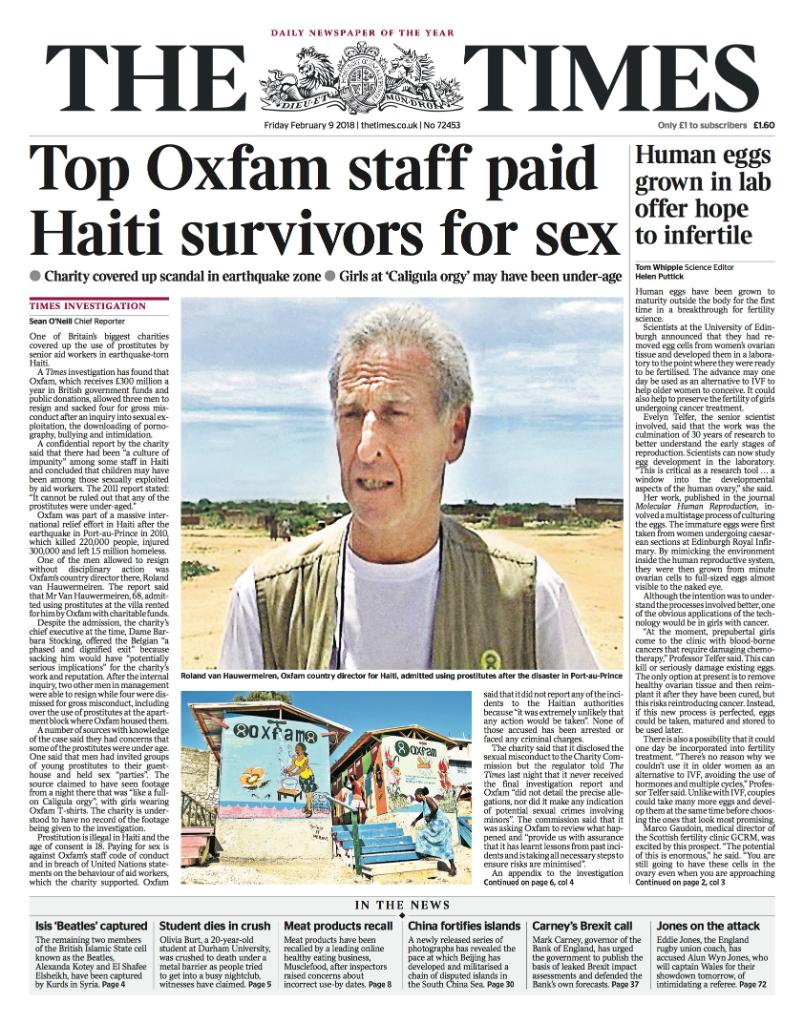Oxfam Crisis notes
Oxfam is in crisis. There must be a whole book of ‘lessons’ from the implosion of this once great British organisation. An implosion caused by a seven-year-old scandal exposed by The Times newspaper last Friday. It is ghastly to watch and a text book example of a ‘crisis’ where new damaging elements of the negative story continue to emerge every day.
Oxfam will be lucky to survive
I feel compelled to declare my personal opinion about this Oxfam crisis. As many know I have worked a lot with charities and agencies in the developing world. I am a huge fan of ‘development work’ in all its guises. If more people knew the great work that is done, the more they would support it.
But it seems all too common for individual incidents of bad behaviour or bad management to be blown out of all proportion in order to discredit all or any development work. There are swathes of society who, with little knowledge of the reality on the ground in developing countries, believe money should not be ‘wasted’ helping people ‘over there’. They are quick to take any example of mismanagement or misappropriation of funds to prove their preconception. The Daily Mail in particular plays to this agenda in ways that many find hugely distasteful. My sympathy is all with Oxfam although of course not with those accused of wrong doing.
Oxfam crisis analysis
That said let’s look at the lessons of this Oxfam crisis.
Public outrage gets ahead of the law. The press likes to bay for blood as soon as any act that would offend a Victorian prude, comes to light. (Always remember this is fake outrage. Few journalists are paragons of virtue in their private lives). The Oxfam country director in Haiti, 7 years ago, admitted to paying for sex. Just to help the headline writers, the party where this happened has been dubbed a ‘Caligula like orgy’ – by ‘sources’ that spoke to The Times. He agreed to step down but his employer, Oxfam, chose not to sack him and not to prevent him working in his profession in the future.
Bad media crises have a habit of having many chapters. If the thing journalists have got their teeth into initially in a crisis is not actually illegal they will often switch the focus to ‘transparency’. Transparency is really difficult when dealing with personnel, commercial and many other issues.
The take-way is that as soon as a crisis starts, someone in the affected organisation needs to be reminding decision-makers that at any moment the whole focus could switch to ‘transparency’. Organisations need to be prepared to be totally transparent or find rock-solid reasons why they cannot be. Transparency can be brutal. Here is an article in CEO Magazine about transparency in a crisis.
Oxfam crisis: what could be done
Anyway, the only way to stop a crisis like this once it gets going is:
- Sack a whole load of people or have them resign. Be careful if you sack, they may sue as Sharon Shoesmith, the social worker in the Baby P case did. And she won. Story here.
- Make an abject public apology. Here is Oxfam’s from CEO Mark Goldring.
- Make vast amounts of detail available to journalists who will quickly get bored.
- Have spokespeople trained and ready to handle the sort of aggressive questioning that we have seen on every serious news programme.
- Hire someone like Alistair Campbell or a specialist crisis firm (or us) to do your messaging and reactive lines. These need to be much more than wishy-washy statements of good intent. You will need substance and a forensic like approach to possible questions.
If you are an organisation full of decent honest people who expect the rest of the world to be measured, decent and honest you have a huge handicap. You will not realise the potential for the crisis to get out of hand and you will not expect the media to go for the jugular. One problem is that sometimes the media does and sometimes it doesn’t. Any doomsayer might be wrong and might damage his or her career by saying ‘this could go ballistic’ when it then doesn’t.
For students of media training lets look at two of the many interviews on this subject.
In this Newsnight interview with Dame Barbara Stocking, the CEO of Oxfam at the time of the Haiti operation, the scandalous bits are all the ‘outraged’ questions from Emily Maitlis. The measured responses from Dame Barbara are barely newsworthy. It was a difficult interview but overall she did well. Personally, I would have liked her to offer a solid apology and be a bit more robust in defense of the decisions Oxfam took. But she was credible and had solid answers. Note this interview was a pre-record. Not a good idea. Dame Barbara should have done it live.
Our second example is a BBC Radio 4 Today programme interview on 12th February – one hour ten minutes in, that is 7.10am. (Remember this disappears after one month.) In this unimpresive interview with Michelle Russell, Head of Investigations at the Charity Commission, it is clear that she had only one simple message and not enough detail to sustain the interview. She appears to be taken aback that Matthew Price, the interviewer, is questioning the competence of the Charity Commissioners themselves. She struggles to cope with what for her was apparently unexpected aggression.
It is the season of sex scandals
It is the season of sex scandals. Post Harvey Weinstein, many things that might in the past have not seemed to be a scandal – potentially are now. I doubt any organisation has no skeletons in the cupboard and I expect most have no idea how they would cope if the spotlight turned on them.
The Orville imagines the rule of law administered by twitter
I cannot finish without recommending a recent episode of The Orville – a brilliant skit on Star Trek running on Fox. In Season 1 Episode 7 Majority Rule, the team visit a parallel planet to Earth, Sargus 4, where the law is administered by popular vote on a planet-wide twitter-like feed. Whilst it is hilarious it is also a bit too close to Earth 2018 for comfort. This is not unrelated to the Oxfam scandal.
- Why Mick Lynch is Right to be Wary of Pre-recorded Interviews - April 16, 2024
- Takeaways from Netflix Scoop: The Prince Andrew Interview - April 10, 2024
- Kate Shows How to Read Autocue - March 26, 2024








I would have found it very tempting , were I in Dame Barbara’s shoes, to have reminded Ms Maitlis of the BBC’s less than perfect handling of the Jimmy Saville crisis, if only to have punctured her (Ms Maitlis’s) tone of moral certitude. But I suspect your advice would be: “Don’t do that”. Any thoughts on that?
All the best,
David